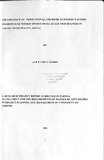| dc.description.abstract | Many Small and Micro-Enterprises or small scale business in Kenya face a host of challenges when it comes to expanding their operations, this is despite their official recognition as a significant contributor to the economy- about 50% of the jobs created in Kenya in 2005 was attributed to this (Economic Survey, 2006). The situation is compounded when we consider women-owned-and run small scale business and more so in the fish industry. Research shows that apart from the high probability of failure standing at three out of five within the first few months, women-owned small-scale businesses in Kenya still face slower growth prospects as compared to those of their male counterparts.
This study sought to understand the growth related challenges they face as traders and how they manage them. It also appreciates the fact that these challenges could be situational, individual and do 'evolve' according to the. changing socioeconomic matrix. The research design employed was descriptive survey. Data was collected from a target population of 114 women owned and-run small scale fish businesses.
Stratified random sampling technique was used together with interview schedules and questionnaires as the preferred research instruments which were pilot tested on 20 non-respondent women for validity and reliability. Quantitative data was analyzed descriptively by computing mean, median and mode and the significance of relationships measured using Clfl-Square. Qualitative data was analyzed using narrative methods. 90 out of the 114 target respondents responded. Concerning the first objective access to capital was still identified as a major constraint with but not as compounded with gender bias as assumed.
The second objective demonstrated that Lake Victoria was still the traditional fish source although fish from aquaculture had only a nominal impact in the markets in the area. Strategic business partnerships and cooperatives were identified in objective three as a viable business arrangement due to their growth and stability prospects in the future.' There was need to encourage the fish mongers to register their businesses in order to foster relations with the municipal authorities and avoid being constantly harassed by the Council askaris.
Minimal stakeholders' participation especially from the government was also seen as a major impediment to growth. Hence, there is need to address these factors in time to better the prospects of the fish industry in the area. It is hoped that the findings will be instrumental in providing valuable insight into the challenges to all relevant stakeholders and give a new dimension to the social feminist theory in terms of the emerging developments of small scale women enterprises in the developing countries. | en_US |

